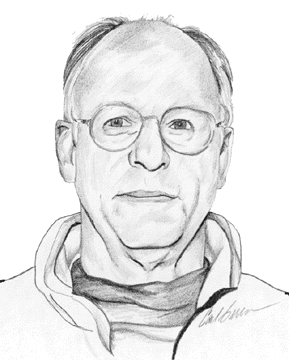INTERVIEW
Tales From The Front
Robert Zellner
by Thom Hartle
Robert Zellner, whose career has ranged from academic to institutional trader to business manager before settling on full-time private trader, started off with his sights aimed on academia, despite a grandfather who was a speculator in the 1920s and 1930s. But it wasn't long before the family genes came into play and Zellner stepped into the trading arena. He has worked for Cook Industries; Drexel Burnham Lambert; and Citibank Futures, among other financial firms. STOCKS & COMMODITIES Editor Thom Hartle met Zellner when their careers overlapped at Drexel back in the 1980s. Hartle interviewed Zellner via telephone on December 22, 1998, asking him about his work, past and present, his views on the markets, and his philosophies about trading.

ILLUSTRATION BY CARL GREEN
Tell me about yourself.
Well, I'm from Florida, and I was always a bit of a dreamer. My father was a doctor and had absolutely no interest in business. In fact, he hated it. My grandfather was a speculator. He made a lot of money back in the 1920s and 1930s, and my father just did not approve. Back in the 1930s, after the crash in 1929, there was a real disenchantment with speculators. So while I had speculation in my background, I just wanted to be an academic.
You had a wide academic background, didn't you?
I had studied everything. I was in premed, I was into art, I was even an English major for a while. I took courses in everything -- except business. Business courses were the only things I never took.
So what changed?
Then, one day, I realized: "Gosh! I'm going to have to go to Vietnam and get shot at!" So I started to search for a way to avoid that.
What did you find?
One day, I learned out about these fellowships that were funded by the Department of Defense, called the National Defense Education Act Title IV Fellowships. This program was a response to the paranoia about the Soviet Union. The idea was to train people in technical subjects. Most of the fellowships went to schools like Harvard and Yale, but the University of Florida had two available, and I ended up getting one of them. I was on schedule to get my degree when, at the end of my first year of doctoral studies, I realized I was going to have my Ph.D. when I was 24, and I was still going to have to go to Vietnam!
What did you do then?
I looked into and was able to get another research fellowship, and that's how I went to work for the Federal Reserve.
Was this the New York bank?
No, I went to work for the Atlanta Fed. There, I met a student from Duke University who was in the same doctoral program I was, and he was writing his dissertation on the Fed funds market, which had just started trading. He explained to me how you could look at it as sort of a supply and demand balance for money.
How did he explain that?
You could look at the balance sheets of the Federal Reserve and a report published by the Fed, called the H-4-2. This report was a balance sheet of the money market banks, which were the 20 largest commercial banks in the US. Basically, it was made up of the New York banks plus two Chicago banks, Continental Bank and First Chicago.
So how did you view this information?
At that time, I was interested in the commodity markets. The guy from Duke showed me how you could look at it as a supply and demand balance issue for money. I thought that was fascinating. That's where I got the idea that money was like a commodity and you could look at the supply?demand balance for money, just like you could for wheat or corn or anything else. After I completed my work in Atlanta, I went back to the University of Florida, and I wrote my master's thesis on consumer credit.
The only time you understand the inscrutable, the only time you have knowledge of it, is after the sun's gone down. After it is over. That's really true of trading. -- Robert Zellner
Excerpted from an article originally published in the March1999 issue of Technical Analysis of STOCKS & COMMODITIES magazine. All rights reserved. © Copyright 1999, Technical Analysis, Inc.